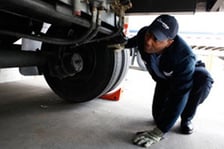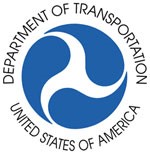 What do you think the most important operating component of a commercial motor vehicle (CMV) is? Although there are many components, the most important one is the part that makes the equipment stop - the brakes!!!!! It is critical that brakes operate properly at all times to ensure safety. The braking system on CMV’s is designed for tough conditions, but like anything, it must be inspected and maintained carefully and consistently. By doing this, the brake system will operate properly throughout the life of the truck.
What do you think the most important operating component of a commercial motor vehicle (CMV) is? Although there are many components, the most important one is the part that makes the equipment stop - the brakes!!!!! It is critical that brakes operate properly at all times to ensure safety. The braking system on CMV’s is designed for tough conditions, but like anything, it must be inspected and maintained carefully and consistently. By doing this, the brake system will operate properly throughout the life of the truck.
Brake Fleet Safety Week was established in 1998 as an annual outreach and enforcement campaign with the goal of improving CMV brake safety and awareness throughout North America. More than 3.4 million brakes have been inspected since the program’s inception.
Brake Fleet Safety Week which is part of the Operation Airbrake program, will be held September 6- 12, 2015. It is sponsored by the Commercial Vehicle Safety Alliance (CVSA) in partnership with the U.S. Department of Transportation’s Federal Motor Carrier Safety Administration (FMCSA). During the week-long brake safety campaign, CMV inspectors will focus on conducting roadside brake system inspections on CMV’s to identify out-of-adjustment brakes and brake system violations.
 Why is Brake Fleet Safety Week necessary? Brake related violations are the largest percentage of all out-of-service violations cited during roadside inspections. The road check in 2014 alone had 46.2% brake violations. Brake systems that are improperly installed or maintained can reduce the braking capacity and stopping distance of CMV’s, thus posing a serious risk to the driver and the general public.
Why is Brake Fleet Safety Week necessary? Brake related violations are the largest percentage of all out-of-service violations cited during roadside inspections. The road check in 2014 alone had 46.2% brake violations. Brake systems that are improperly installed or maintained can reduce the braking capacity and stopping distance of CMV’s, thus posing a serious risk to the driver and the general public.
Typically, the brake inspections conducted during Brake Safety Week include the inspection of brake system components to identify loose or missing parts, air or hydraulic fluid leaks, worn linings, hoses, pads, drums or rotors, and other faulty brake-system components. Antilock braking systems (ABS) malfunction indicator lamps are also checked on the cab dash. Defective or out-of-adjustment brakes will result in the vehicle being placed out of service and subsequent violation.
The question is - will these inspections post to CSA?
Yes! These brake inspections are primarily a Level IV roadside inspection and will be handled just like any other roadside inspection.
It has been reported by the CVSA that in 2014, there were 13,305 vehicles inspected during Brake Safety Week. Some of the results are shown below.
2014 Brake Safety Week Results:
- 13,305 vehicles were inspected (20,067 inspected in 2013)
- 1,388 or 10.4 percent of vehicles were placed OOS for brake adjustment (9.0 in 2013, 9.4 percent in 2012, 8.4 percent in 2011)
- 1,244 or 9.3 percent of vehicles were placed OOS for brake components (7.1 percent in 2013, 7.8 percent in 2012, 7.9 percent in 2011)
- 1,658 or 16.2 percent of vehicles were placed OOS for brakes overall (13.5 percent in 2013, 15.3 percent in 2012, 14.2 percent in 2011)
What should a motor carrier do to have a successful Brake Safety Week?
 Motor carriers should ensure that their drivers are completing inspections on their CMV’s daily for each vehicle operated per the Department of Transportation (DOT) regulations Part 396. Any deficiencies should be documented during the driver’s inspection and repaired prior to going on the road. In regards to the braking system, the driver can listen for audible air leaks, check low air signals and look for component damage. As for ABS equipped CMVs, a properly functioning ABS malfunction lamp on the dash will turn on and then off when power is supplied to the unit. If the ABS lamp does not illuminate at all, you likely have a malfunctioning system. Also, if the ABS lamp illuminates and stays on, it is another indication of a problem that must be checked and corrected. Either way, both of these conditions indicate an ABS system problem and will be documented as violations during a roadside inspection.
Motor carriers should ensure that their drivers are completing inspections on their CMV’s daily for each vehicle operated per the Department of Transportation (DOT) regulations Part 396. Any deficiencies should be documented during the driver’s inspection and repaired prior to going on the road. In regards to the braking system, the driver can listen for audible air leaks, check low air signals and look for component damage. As for ABS equipped CMVs, a properly functioning ABS malfunction lamp on the dash will turn on and then off when power is supplied to the unit. If the ABS lamp does not illuminate at all, you likely have a malfunctioning system. Also, if the ABS lamp illuminates and stays on, it is another indication of a problem that must be checked and corrected. Either way, both of these conditions indicate an ABS system problem and will be documented as violations during a roadside inspection.
Since out of adjustment brakes and brake system violations represent almost half of all out-of-service violations issued to CMV’s on the road, it is critical that attention is taken to ensure that brake systems are properly installed, inspected and maintained. These actions will improve CMV safety by reducing the number of highway crashes.
More information on Brake Safety Week: September 6- 12, 2015 can be found via the CVSA link below.
http://www.cvsa.org/programs/brake-safety-week-2015.php
Want more news on Fleet Safety? Check out the latest article written by Sandy Rosenfeld, CTP - Safety & Operations Manager in this week's Transport Topics titled:






